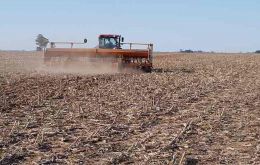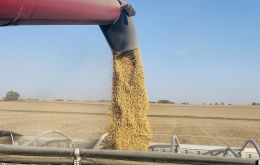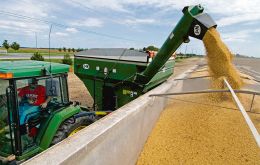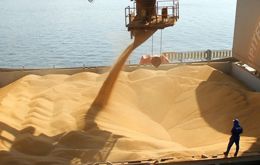MercoPress. South Atlantic News Agency
Tag: Soybeans
-
Saturday, November 21st 2020 - 08:49 UTC
US soybeans futures hit a four year high on dry conditions in key South American crop areas

U.S. soybean futures rose for a sixth consecutive session on Friday and hit a four-year high on dry conditions in key South American crop areas and concerns about dwindling U.S. supplies. Corn also gained on strong exports and worries about South American dryness, while wheat ended mixed.
-
Wednesday, November 4th 2020 - 08:50 UTC
US soybeans being loaded in Louisiana for Brazil

A U.S. grain export terminal near Baton Rouge, Louisiana, is loading about 38,000 tons of U.S. soybeans on a bulk cargo vessel for shipment to Brazil, according to Southport Agencies shipping lineup.
-
Saturday, October 31st 2020 - 17:21 UTC
Brazil purchasing soybeans from the United States for the domestic market

Bloomberg has reported that the United States began selling soybeans to Brazil after the Chamber of Foreign Trade (CAMEX) temporarily suspended import tariffs for corn and soybeans. This is a rare event that can be explained because Brazil has taken the lead in the production and export of the oilseed.
-
Wednesday, September 23rd 2020 - 08:34 UTC
Brazil buying Uruguayan soybeans to compensate for lowest stockpiles in decades

With stockpiles of oilseed at their lowest in decades, Brazil's Bunge SA is processing soybeans from Paraguay, and now also from Uruguay, which also plants over a million hectares of the oilseed.
-
Thursday, September 17th 2020 - 09:01 UTC
Brazil's agribusiness exports in August reached US$ 8,9bn: China main client

Brazil's agribusiness exports during August 2020, reached US$ 8.91 billion, an increase of 7.8% in relation to the same month in 2019 (US$ 8.26 billion). Between August 2019 and 2020, agribusiness product exports grew by 16.5% in absolute values.
-
Tuesday, August 4th 2020 - 10:20 UTC
Ship with Brazilian soybeans arrives in China with several crew members Covid-19 tested positive

According to the Agricensus Agency, a load of Brazilian soy exported to northern China was detained on July 25 because ten crew members aboard a ship from Rio Grande do Sul have tested positive for Covid-19.
-
Wednesday, April 29th 2020 - 07:41 UTC
China's imports of Brazilian soybeans drop 24.8% during March over a year ago

Brazilian soybeans imports to China during the month of March dropped 24.8%, over the same month last year. The data was released by the Chinese General Customs Administration last Sunday, April 26, and shows soy imports from Brazil reached 2.1 million tons in March, compared to 2.79 million tons in the same period last year.
-
Tuesday, March 3rd 2020 - 08:21 UTC
Brazil's soybeans sales to China and soy-meal exports to the EU remain very strong

Brazil, the world’s largest soy producer, and supplier, shipped 3.55 million tons of soybeans in the first three weeks of February, up 367% month on month, according to a report from the Brazilian foreign trade department.
-
Thursday, February 20th 2020 - 18:30 UTC
Despite excess rainfall in the north, Argentina still expects to collect 53.1 million tons of soybeans

It rained more in two days than it usually does in a month in some northern Argentine soy growing areas recently, but the crop losses will have little effect on national production when harvesting starts next month, farm weather experts said.
-
Wednesday, February 19th 2020 - 06:49 UTC
China lifts tariffs on 696 products imported from the US, including farm and energy products

China said on Tuesday it would accept applications for new tariff exemptions for 696 products imported from the United States including key agricultural and energy products such as pork, beef, soybeans, liquefied natural gas and crude oil.
